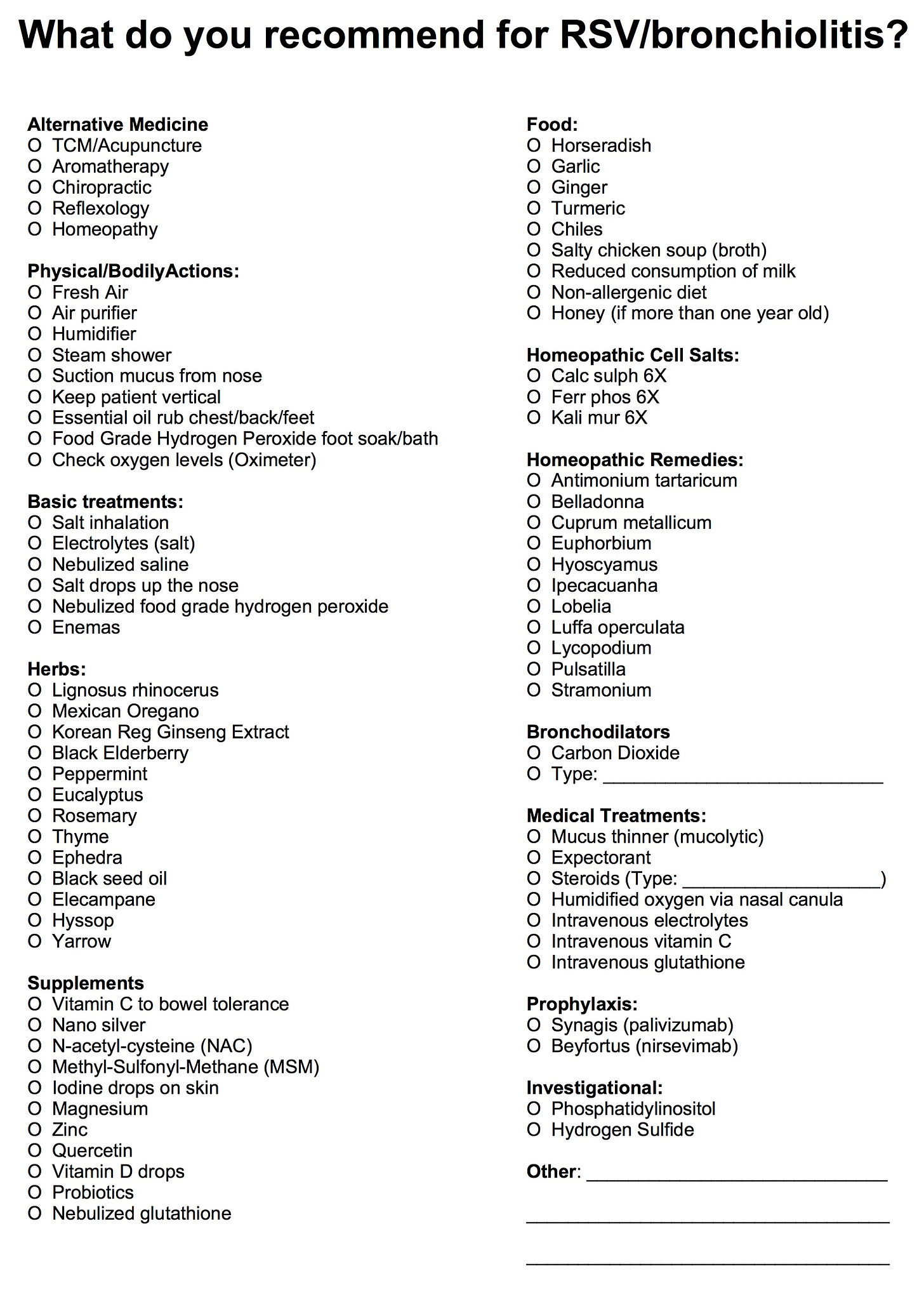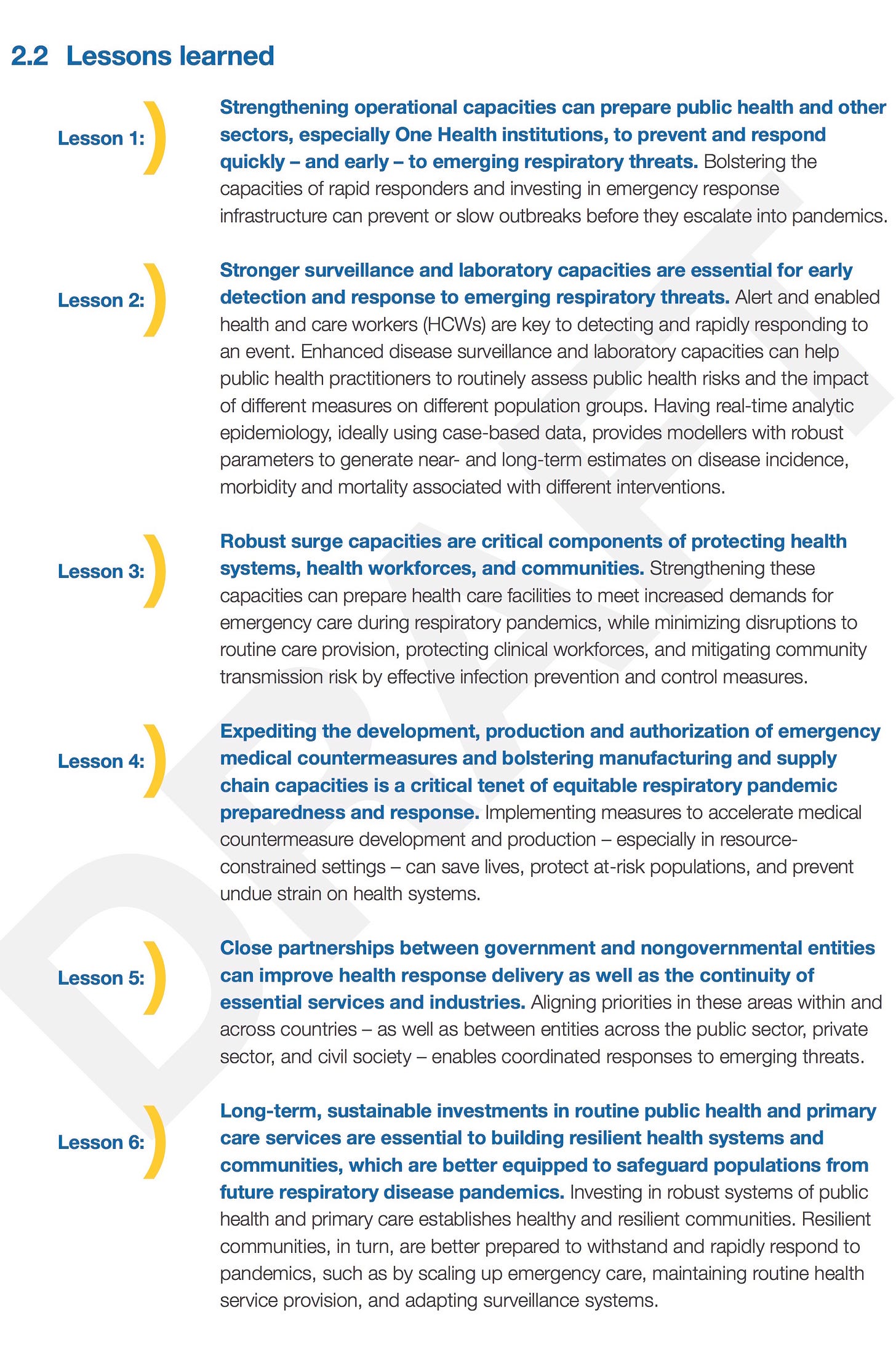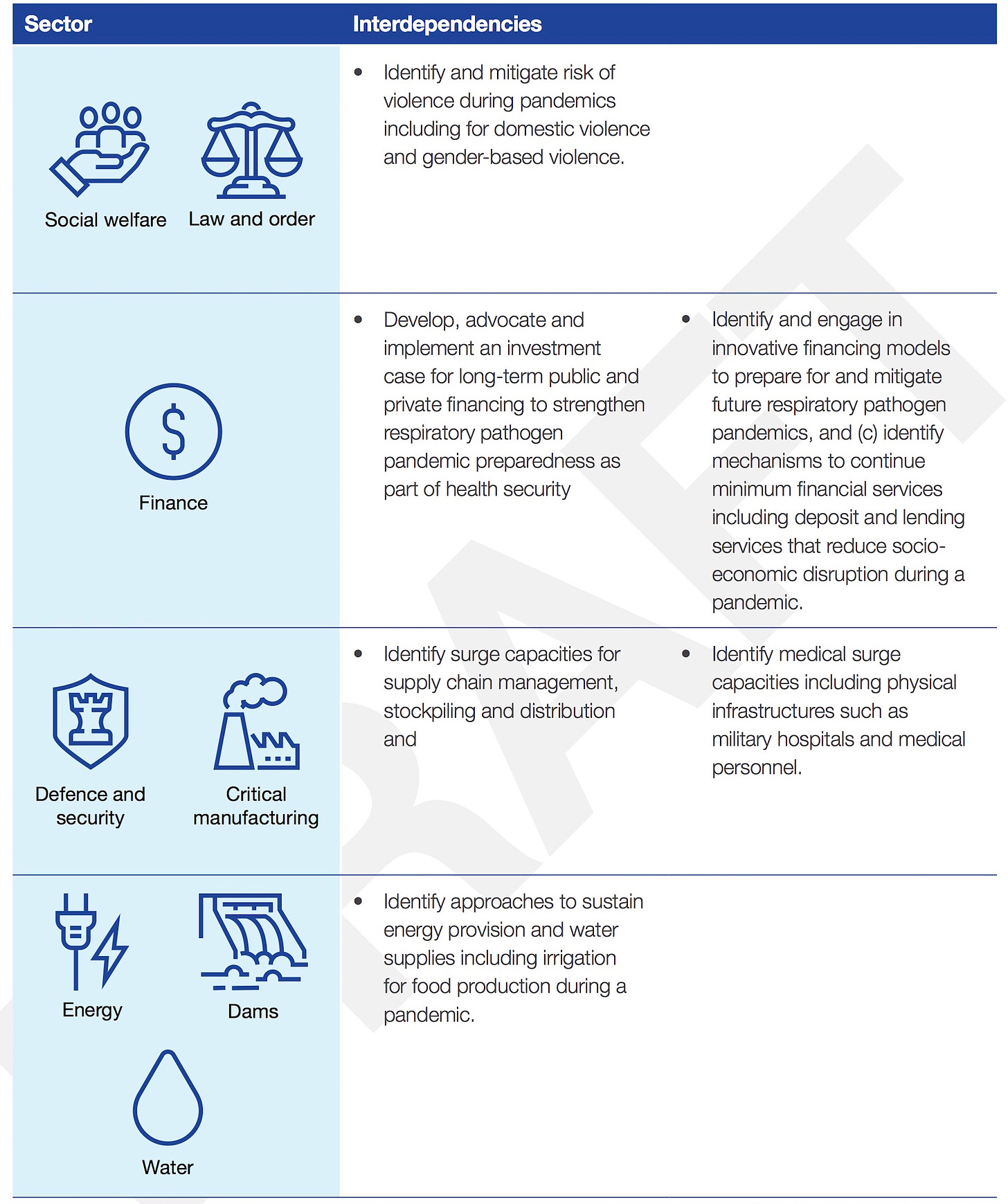Preparedness and Resilience for Emerging Threats (PRET)
The WHO just launched a new "initiative." EVERY DOCTOR AND EVERY PERSON ON EARTH NEEDS TO SPEAK UP REGARDING THIS NEW "INITIATIVE" BY THE WORLD HEALTH ORGANIZATION.
Please watch the video below…
To skip the advertising, forward to the 6 minute mark which is where the interview begins.
https://rumble.com/v2kone4-who-calls-for-accelerating-preparedness-for-global-threat-but-why.html
I believe that if you take the time to comprehend the information in this article, you will begin to understand the well disguised threat that we all face.
As noted in my previous article regarding the Global Digital Health Certification Network, the WHO is NOT waiting for approval. The WHO has been and is continuously moving forward in order to implement the ideas that are supposedly being “negotiated” in the proposed “Pandemic Treaty” and the proposed amendments to the International Health Regulations.
The WHO is actively “operationalizing” the objectives of those negotiations before the agreements are reached. They are simply assuming that we will remain silent and compliant while they move forward with their plans to control every aspect of our lives.
The WHO recently (April 26, 2023) announced a new “initiative.” They stated:
“Whole-of-society action is needed to make the progress outlined in this Call to Action.”
“This is a Call to Action to accelerate preparedness for pandemics and emerging threats globally.”
“The initiative can also serve to operationalize the objectives and provisions of the Pandemic Accord, which is currently being negotiated by WHO Member States.”
The WHO has developed an approach to “pathogens with pandemic potential” that focuses on pathogens by category. The first category that they have chosen to focus on is respiratory pathogens.
I published THIS ARTICLE on November 6, 2022 regarding Respiratory Syncytial Virus (RSV). At that time I challenged all the doctors in the world to develop early treatment protocols for RSV.
Here is a one page excerpt and the entire PDF that I published on November 6, 2022.
Let’s NOT make the same mistake again.
I encourage everyone on earth to be proactive and demand that your doctor provide you with their recommended early treatment protocols for the respiratory pathogens listed above.
I challenge doctors around the world to develop early treatment protocols for of all of the respiratory pathogens listed above in order to pre-empt the policy decisions that the WHO is directing “public health officials” to begin developing.
EVERY DOCTOR AND EVERY PERSON ON EARTH NEEDS TO SPEAK UP REGARDING THIS NEW “INITIATIVE” BY THE WORLD HEALTH ORGANIZATION.
Doctors and all people around the world have an opportunity to lead.
Do NOT miss this opportunity!
Please become a “super-spreader” of this article!
The lessons that the World Health Organization claims to have learned are NOT the lessons that they need to learn from the past 3+ years.
The lessons that they claim to have learned are the lessons that the Pharmaceutical Hospital Emergency Industrial Complex want them to believe.
WHO launches new initiative to improve pandemic preparedness
26 April 2023
To help countries better prepare for future pandemics, WHO launched a new initiative today that provides guidance on integrated planning for responding to any respiratory pathogen such as influenza or coronaviruses.
The new Preparedness and Resilience for Emerging Threats Initiative, or PRET, incorporates the latest tools and approaches for shared learning and collective action established during the COVID-19 pandemic and other recent public health emergencies.
Through the initiative, WHO will use a mode of transmission approach to guide countries in pandemic planning, given that many capacities and capabilities are common among groups of pathogens. PRET answers the call for technical guidance and support for promoting and strengthening integrated preparedness and response, as outlined in World Health Assembly resolutions.
The COVID-19 pandemic and other health emergencies have shown that countries need to be operationally ready to respond to infectious disease threats, with tailored preparedness plans in hand and better coordination and collaboration with other sectors such as agriculture.
Below is a clear example of how the WHO’s “One Health Approach” would be used to take over complete control of our lives.
“Preparedness, prevention, and response activities must not be the province of the health sector alone,” said Dr Tedros Adhanom Ghebreyesus, WHO Director-General. “Just as health emergencies have impacts across many sectors, so must our preparedness and response efforts span sectors, disciplines and pathogens.
It is critical, too, that community engagement and equity are the centre of our efforts, especially for those populations that are marginalized and most at risk.”
PRET is an evolution in WHO’s approach to pandemic preparedness through the application of a mode of transmission lens, rather than a focus on specific diseases. WHO will continue to develop and disseminate guidance on specific diseases as needed.
The launch of the initiative is taking place on the last day of meetings with over 120 individuals representing Member States, partners, and the WHO secretariat, to define the path forward for PRET, including the development of a global implementation roadmap for respiratory pathogen pandemic preparedness.
The PRET Initiative’s first module focuses on respiratory pathogens, including influenza, coronaviruses, and respiratory syncytial virus.
Given the ongoing COVID-19 pandemic and the possible threat of avian influenza, this module will enable countries to critically review, test, and update their respiratory pandemic planning efforts to ensure they have the functional capacities and capabilities in place.
COMING SOON…
FYI: An “arbovirus” is the informal name for any virus that is transmitted by arthropod vectors.
A process is underway to identify the next group of pathogens, such as arboviruses, to be addressed under this initiative.
This will follow priorities identified through the ten proposals to strengthen the global architecture for health emergency preparedness, response, and resilience (HEPR).
The PRET Initiative ushers in a new era for pandemic preparedness and represents an evolution of WHO’s core activities to support all Member States in strengthening health emergency preparedness, prevention, and response capacities and capabilities.
The initiative can also serve to operationalize the objectives and provisions of the Pandemic Accord, which is currently being negotiated by WHO Member States.
Following inputs and discussions among meeting participants, WHO invites stakeholders to this global call to action to advance respiratory pathogen pandemic preparedness.
Call to Action
WHO, Member States, and partners are working together to identify and implement priority actions to strengthen national, regional, and global preparedness for pandemics and emerging infectious disease threats. We recognize the role of communities and all sectors, and the need for harmonized and sustained momentum to end the cycle of panic and neglect that is all too common in pandemic preparedness and response.
We recall lessons from previous epidemics and pandemics, especially those caused by respiratory pathogens. These pathogens have and will continue to pose a significant global threat with the potential to cause tremendous morbidity and mortality, overwhelm health systems, de-stabilize the global economy, and exacerbate inequities, which exist in the access to both the tools to prevent pandemics and health care for all people.
This is a Call to Action to accelerate preparedness for pandemics and emerging threats globally. Effective preparedness relies on robust planning and coordinated action. A collective commitment on the following actions will see progress achieved by December 2025 as will be described in the Preparedness and Resilience for Emerging Threats (PRET) monitoring framework:
Update preparedness plans that affirm priority actions and that have considered learnings from past events. Recognizing the risk posed by respiratory pathogens, planning for a respiratory pathogen pandemic based on the themes identified in the PRET Module #1: Planning for Respiratory Pathogen Pandemics is a priority
Increase connectivity among stakeholders in pandemic preparedness planning through systematic coordination and cooperation. This includes building equitable systems; conducting joint exercises; and sharing information on good practices, challenges, and opportunities.
Dedicate sustained investments, financing and monitoring of pandemic preparedness with a particular focus on addressing the gaps identified during past pandemics and epidemics.
The COVID-19 pandemic response has demonstrated what can be achieved with political commitment, community engagement and funding. At the heart of this work is to ensure equity to be ready for the next pandemic together. Whole-of-society action is needed to make the progress outlined in this Call to Action. Implementation should therefore strengthen the resilience of communities; maintain, sustain, and build on routine systems; and leverage broader capacities for emergency preparedness and response.
This Call to Action was released at the Preparedness and Resilience for Emerging Threats (PRET): Global Meeting for Future Respiratory Pathogen Pandemics held on 24-26 April 2023 in Geneva, Switzerland.
SOURCE:
The Preparedness and Resilience for Emerging Threats (PRET) Initiative
The Preparedness and Resilience for Emerging Threats (PRET) initiative is an innovative approach to improving disease pandemic preparedness. It recognizes that the same systems, capacities, knowledge, and tools can be leveraged and applied for groups of pathogens based on their mode of transmission (respiratory, vector-borne, food-borne etc.). PRET incorporates the latest tools and approaches for shared learning and collective action established during the COVID-19 pandemic and other recent public health emergencies. It places the principles of equity, inclusivity, and coherence at the forefront. PRET provides a platform for national, regional and global stakeholders to collaborate to strengthen preparedness. Technical resource packs, a peer learning network and a community of practice are coming soon to help stakeholders update their preparedness plans and share experiences.
About Us:
PRET builds on the current momentum to strengthen the global architecture for health security (prevention, preparedness, response and resilience). In accordance with resolutions WHA58.5 and WHA74.7, it operationalizes the vision of a more equitable and robust response to future disease pandemics. Drawing upon lessons from previous events and identified gaps and opportunities, PRET helps stakeholders to converge resources and ensure that there is:
clarity on implementation priorities as established by country authorities, and in line with regional and global mandates;
increased opportunity for collaboration; and
common and systematic roll-out of resources that facilitates cross-country and cross-stakeholder actions.
Respiratory Pathogens Partners Engagement Forum (R-PEF)
To strengthen networking for respiratory pathogen preparedness planning, WHO convenes an informal coordination forum, the Respiratory Pathogens Partners Engagement Forum (R-PEF). The R-PEF enables WHO and partners to exchange information on planned activities, lessons learnt, gaps and needs, reviews, and other developments relating to pandemic preparedness for respiratory pathogens. More information on the R-PEF is available on the Terms of Reference.
https://cdn.who.int/media/docs/default-source/influenza/r-pef/r-pef-tor-1-april-2022.pdf
Useful information
Before the COVID-19 pandemic, 92 (47%) Member States reported having respiratory pathogen (influenza) pandemic preparedness plans. Many Member States adapted these plans to support their COVID-19 response. Throughout the pandemic, additional Member States developed or updated their plans with 176 (91%) reporting that they had a COVID-19 pandemic response plan in 2021.
WHO has set global targets for Member States to develop or update their respiratory pathogen pandemic plans:
SOURCES:
https://www.who.int/initiatives/preparedness-and-resilience-for-emerging-threats
https://www.who.int/publications/i/item/9789241515962
https://twitter.com/WHO/status/1651200402140938241
by James Roguski
The old system is crumbling, and we must build its replacement quickly.
If you are fed up with the government, hospital, medical, pharmaceutical, media, industrial complex and would like to help build a holistic alternative to the WHO, then feel free to contact me directly anytime.
JamesRoguski.substack.com/about
JamesRoguski.substack.com/archive
310-619-3055
All content is free to all readers.
All support is deeply appreciated.




























Thank you James for everything you do! God Bless you!
this sick F*** needs to be 6' under along with his psycho bum buddies 🎶 🇨🇦 ☮️
“Preparedness, prevention, and response activities must not be the province of the health sector alone,” said Dr Tedros Adhanom Ghebreyesus, WHO Director-General. “Just as health emergencies have impacts across many sectors, so must our preparedness and response efforts span sectors, disciplines and pathogens."